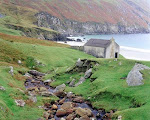US intel nominee promises no unlawful surveillance
 Agence France-Presse
Agence France-Presse
January 22, 2009
SourcePresident Barack Obama's nominee to head US intelligence Thursday flatly rejected torture, promised to end special interrogation regimes and refuse the unlawful surveillance of Americans.Retired admiral Dennis Blair indicated major changes are in store for US intelligence agencies, which have been embroiled in controversy over secret prisons, interrogation practics, and warrantless wiretapping of Americans."Torture is not moral, is not legal, is not effective," Blair said at his Senate confirmation hearing.Blair told the Senate Intelligence Committee he would welcome independent monitoring of the intelligence community "to prevent abuses and protect privacy and civil liberties of Americans."However, he refused to say waterboarding, a form of simulating drowning, is torture, because he did not want to put in legal jeopardy intelligence officers who engaged in practices authorized at the highest levels."I don't intend to reopen those cases of those officers," he said.Senator Carl Levin said he was "troubled" by Blair's answer.For the most part, however, Democratic lawmakers praised Blair's candor while some Republicans expressed skepticism about abandoning the more hardline approach of the previous administration.Blair sketched out a heavy workload for the US intelligence community -- three ongoing wars, concerns about developments in North Korea, Iran and the Israeli-Palestinian crisis, and newer issues like global warming and energy security."President Obama has made it clear, made it clear to me, made it clear to the American people, that he expects independent analysis," he said."He wants the facts. He wants all points of view. And if confirmed, I will strive to meet his expectations."The Senate hearing came as Obama signed a flurry of executive orders directing the closure of the US detention center at Guantanamo within a year, shutting secret CIA prisons, and placing restrictions on interrogations and the treatment of detainees.Blair acknowledged that striking the right balance between protecting Americans and safeguarding US values and international reputation will be difficult.The United States, he said, has not yet found "the correct way to treat this new type of campaign that we are engaged in.""On the one hand, we have to fight it like a war and detain people and get information from them and protect our citizens."On the other hand, we have to maintain our stature as the country that is governed by our values and governed by ideals. We've gone back and forth in many different ways."These executive orders are going to give this administration a chance to look at those tough issues and come up with creative solutions for them," he said.He said he supported uniform rules of interrogation for the military and intelligence services, but he said the rules themselves should be developed as part of a comprehensive policy review.Official: UN may prosecute Bush administration,
regardless of US action
 David Edwards
David Edwards
Thursday January 22, 2009
SourceThe UN's special torture rapporteur called on the US Tuesday to pursue former president George W. Bush and defence secretary Donald Rumsfeld for torture and bad treatment of Guantanamo prisoners."Judicially speaking, the United States has a clear obligation" to bring proceedings against Bush and Rumsfeld, the United Nations Special Rapporteur on Torture Manfred Nowak said, in remarks to be broadcast on Germany's ZDF television Tuesday evening.He noted Washington had ratified the UN convention on torture which required "all means, particularly penal law" to be used to bring proceedings against those violating it."We have all these documents that are now publicly available that prove that these methods of interrogation were intentionally ordered by Rumsfeld," against detainees at the US prison facility in Guantanamo Bay, Cuba, Nowak said."But obviously the highest authorities in the United States were aware of this," added Nowak, who authored a UN investigation report on the Guantanamo prison.Bush stepped down from power Tuesday, with Barack Obama becoming the 44th president of the United States.Asked about chances to bring legal action against Bush and Rumsfeld, Nowak said: "In principle yes. I think the evidence is on the table."At issue, however, is whether "American law will recognise these forms of torture."A bipartisan Senate report released last month found Rumsfeld and other top administration officials responsible for abuse of Guantanamo detainees in US custody.It said Rumsfeld authorized harsh interrogation techniques on December 2, 2002 at the Guantanamo prison, although he ruled them out a month later.The coercive measures were based on a document signed by Bush in February, 2002.French, German and US rights groups have previously said they wanted to bring legal action against Rumsfeld.Go to source for video from MSNBC's Countdown, broadcast Jan. 21, 2009.Obama Revokes Bush
Executive Order on Presidential Archives
Forces release of Bush Records!
 By Hal Turner
By Hal Turner
January 21, 2009
Source"Hal Turner Show" -- Washington, DC -- Barack Obama today revoked President George W. Bush's Executive Order which makes presidential records secret for up to 12 years after leaving office!This would be the first logical step for his Administration to take if they were/are considering going after Bush for criminal prosecution over. . . . . the fraud he perpetrated against the nation by lying to take us to war in Iraq.The very last section of Obama's Executive Order issued today (Here) states "Sec. 6. Revocation. Executive Order 13233 of November 1, 2001, is revoked." This puts up for public consumption, most of the records from the Bush administration and I suspect those records will provide the legal basis for criminal prosecution of Bush and Cheney.George W. may want to jump on a plane and head to his family's 100,000 acre refuge in Paraguay so he can be safe from extradition!Personally, I would LOVE to see Bush criminally prosecuted and, if found guilty, hung by his neck just like Saddam Hussein.Executive Order 13233From Wikipedia, the free encyclopediaExecutive Order 13233 limited access to the records of former United States Presidents. It was drafted by then White House Counsel Alberto Gonzales and issued by President George W. Bush on November 1, 2001. Section 13 of Order 13233 revoked Executive Order 12667 of January 18, 1989. The Order was partially struck down in October 2007, and President Barack Obama completely revoked it by executive order on January 21, 2009. http://en.wikipedia.org/wiki/Executive_Order_13233Related here






















